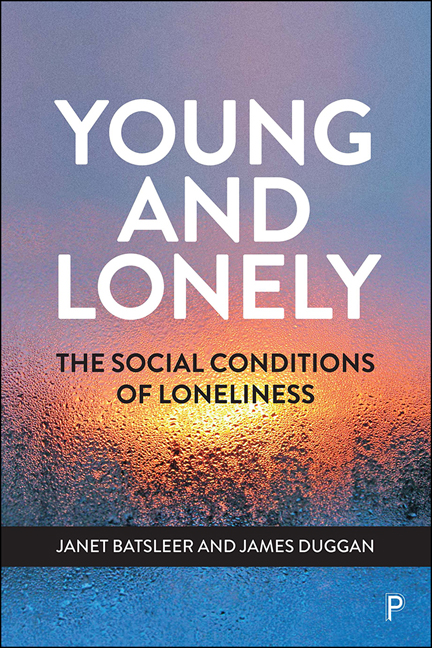Book contents
- Frontmatter
- Contents
- Notes on the Authors
- Acknowledgements
- Preface
- 1 Animate, Attune, Amplify
- 2 Finding Oneself a Loneliness Agenda
- 3 I’M New Here: Creating a New Research Project and A Young Person Led Research Agenda
- Part I The Social Conditions of Loneliness
- Part II The Experience of Loneliness
- Part III Building Friendship and Connection
- References
- Index
Preface
Published online by Cambridge University Press: 18 March 2021
- Frontmatter
- Contents
- Notes on the Authors
- Acknowledgements
- Preface
- 1 Animate, Attune, Amplify
- 2 Finding Oneself a Loneliness Agenda
- 3 I’M New Here: Creating a New Research Project and A Young Person Led Research Agenda
- Part I The Social Conditions of Loneliness
- Part II The Experience of Loneliness
- Part III Building Friendship and Connection
- References
- Index
Summary
We finished this book during the COVID-19 lockdown. The United Kingdom went into lockdown on 23 March 2020. We were required to stay at home, except for running essential errands. We have mostly been locked in our homes, pondering our old lives, making sense of what we have now and imagining the future we will come to inhabit.
This experience of coherence in our global and national experience – we are all here when the COVID-19 pandemic happens – has at the same time been an event of difference and diversity. For some, lockdown has been an opportunity to spend time with family, to bake bread or to re-learn a dusty musical instrument. Yet for others it has meant intense isolation: time spent in a flat alone, or working essential jobs such as nursing or delivering food. People have been unable to visit sick relatives in hospital, hold their hands as they die or attend their funerals. The UK Government (2020) states 42,288 people have died (as of 18 June) without accounting for deaths in care homes and ‘excess’ deaths.
The Lancet's recent ‘call for action’ around the COVID-19 pandemic (Holmes et al, 2020) highlights the troubling associations of loneliness and isolation with anxiety, depression, self-harm and suicide across the lifecourse. Thinking through the implications of lockdown, it is apparent that those with pre-existing vulnerabilities and without support networks or capacities (for example, people with learning difficulties, people living in cramped housing and in financial precarity) are increasingly likely to experience loneliness and mental health issues. Similarly, the ‘week one’ data of the UCL Social Study suggests that groups that were already vulnerable to loneliness are more likely to be experiencing loneliness during lockdown, including young people and categorising students as high risk (Bu et al, 2020). It is apparent that the pandemic is intensifying and exacerbating previously existing vulnerabilities.
Poverty, inequality, precarity and difference were all found in the Loneliness Connects Us study to be entangled with experiences of loneliness. Loneliness was found not to be the fault of individuals but rather a universal experience that is highly complex, relational and personal. This common yet painful experience is more likely and harder to escape if you haven't the resources to participate in social life, if you are poor in a society which is about winning and wealth. If you are Trans+ and no-one else knows.
- Type
- Chapter
- Information
- Young and LonelyThe Social Conditions of Loneliness, pp. vii - viiiPublisher: Bristol University PressPrint publication year: 2020

